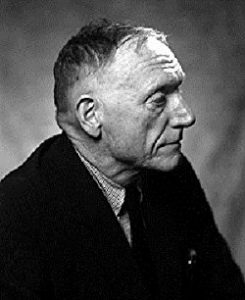ANOTHER GREAT BEGINNING, WITH AN AFTERWARD ABOUT FAMILY: ALL THE KING’S MEN
 Among books I pulled off my shelves in search of especially interesting beginnings, Robert Penn Warren’s All the King’s Men struck me not only because it’s captivating but because it captivates by description. I must warn the reader, however, that this 1947 Pulitzer Prize-winning novel is set primarily in the U.S. South between the two world wars, and its first-person narrator employs racist slurs as a matter of course. But, really, isn’t it better that we face our heritage as a country of slavery and racism?
Among books I pulled off my shelves in search of especially interesting beginnings, Robert Penn Warren’s All the King’s Men struck me not only because it’s captivating but because it captivates by description. I must warn the reader, however, that this 1947 Pulitzer Prize-winning novel is set primarily in the U.S. South between the two world wars, and its first-person narrator employs racist slurs as a matter of course. But, really, isn’t it better that we face our heritage as a country of slavery and racism?
So if you are willing to accept being shown in the national mirror something we are collectively ashamed of, I ask whether you’ve ever read better descriptive prose than Warren’s beginning of All the King’s Men or whether you’ve ever been more drawn into a book by a descriptive beginning?
 “To get there you follow Highway 58, going northeast out of the city, and it is a good highway and new. Or was new, that day we went up it. You look up the highway and it is straight for miles, coming at you, with the black line down the center coming at and at you, black and slick and tarry-shining against the white of the slab so that only the black line is clear, coming at you with the whine of the tires, and if you don’t quit staring at that line and don’t take a few deep breaths and slap yourself hard on the back of the neck you’ll hypnotize yourself and you’ll come to just at the moment when the right front wheel hooks over into the black dirt shoulder of the slab, and you’ll try to jerk her back on but you can’t because the slab is high like a curb, and maybe you’ll try to reach to turn off the ignition just as she starts the dive. But you won’t make it, of course. Then a nigger chopping cotton a mile away, he’ll look up and see the little column of black smoke standing up above the vitriolic, arsenical green of the cotton rows, and up against the violent, metallic, throbbing blue of the sky, and he’ll say, “Lawd God, hit’s a-nudder one done done hit!” And the next nigger down the next row, he’ll say, “Lawd God,” and the first nigger will giggle, and the hose will lift again and the blade will flash in the sun like a heliograph. Then a few days later the boys from the Highway Department will mark the spot with a little metal square on a meatal rod stuck in the black dirt off the shoulder, the metal square painted white and on it in black a skull and crossbones. Later on love vine will climb up it, out of the weeds.
“To get there you follow Highway 58, going northeast out of the city, and it is a good highway and new. Or was new, that day we went up it. You look up the highway and it is straight for miles, coming at you, with the black line down the center coming at and at you, black and slick and tarry-shining against the white of the slab so that only the black line is clear, coming at you with the whine of the tires, and if you don’t quit staring at that line and don’t take a few deep breaths and slap yourself hard on the back of the neck you’ll hypnotize yourself and you’ll come to just at the moment when the right front wheel hooks over into the black dirt shoulder of the slab, and you’ll try to jerk her back on but you can’t because the slab is high like a curb, and maybe you’ll try to reach to turn off the ignition just as she starts the dive. But you won’t make it, of course. Then a nigger chopping cotton a mile away, he’ll look up and see the little column of black smoke standing up above the vitriolic, arsenical green of the cotton rows, and up against the violent, metallic, throbbing blue of the sky, and he’ll say, “Lawd God, hit’s a-nudder one done done hit!” And the next nigger down the next row, he’ll say, “Lawd God,” and the first nigger will giggle, and the hose will lift again and the blade will flash in the sun like a heliograph. Then a few days later the boys from the Highway Department will mark the spot with a little metal square on a meatal rod stuck in the black dirt off the shoulder, the metal square painted white and on it in black a skull and crossbones. Later on love vine will climb up it, out of the weeds.
“But if you wake up in time and don’t hook your wheel off the slab, you’ll go whipping on into the dazzle and now and then a car will come at you steady out of the dazzle and will pass you with a snatching sound as though God-Almighty had ripped a tin roof loose with his bare hands. Way off ahead of you, at the horizon where the cotton fields are blurred into the light, the slab will glitter and gleam like water, as though the road were flooded. You’ll go whipping toward it, but it will always be ahead of you, the bright, flooded place, like a mirage. You’ll go past the little white metal squares set on metal rods, with the skull and crossbones on them to mark the spot. For this is the country where the age of the internal combustion engine has come into its own. Where every boy is Barney Oldfield, and the girls wear organdy and batiste and eyelet embroidery and no panties on account of the climate and have smooth little faces to break your heart and when the wind of the car’s speed lifts up their hair at the temples you see the sweet little beads of perspiration nestling there, and they sit low in the seat with their little spines crooked and their bent knees high toward the dashboard and not too close together for cool, if you could call it that, from the hood ventilator. Where the smell of gasoline and burning brake bands and redeye is sweeter than myrrh. Where the eight-cylinder jobs come roaring around the curves in the red hills and scatter the gravel like spray, and when they ever get down in the flat country and hit the new slab, God have mercy on the mariner.”
In the front cover of my copy of All the King’s Men I wrote “page 53.” Looking there, I found a passage about family, which, though it has nothing to do with how the book begins, I offer here as a further example of Warren’s narrator’s fascinating voice.
“The child comes home and the parent puts the hooks in him. The old man, or the woman, as the case may be, hasn’t got anything to say to the child. All he wants is to have that child sit in a chair for a couple of hours and then go off to bed under the same roof. It’s not love. I am not saying that there is not such a thing as love. I am merely pointing to something which is different from love but which sometimes goes by the name of love. It may well be that without this thing which I am talking about there would not be any love. But this thing in itself is not love. It is just something in the blood. It is a kind of blood greed, and it is the fate of a man. It is the thing which man has which distinguishes him from the happy brute creation. When you get born your father and mother lost something out of themselves, and they are going to bust a hame trying to get it back, and you are it. They know they can’t get it all back but they will get as big a chunk out of you as they can. And the good old family reunion, with picnic dinner under the maples, is very much like diving into the octopus tank at the aquarium. Anyway, that is what I would have said back then, that evening.”
Gary Garth McCann
First-prize winner for short works and for suspense/mystery, Maryland Writers’ Association, Gary Garth McCann is the author of the novella Young and in Love? and of the novels The Shape of the Earth and The Man Who Asked To Be Killed, praised at the Washington Independent Review of Books. His most recent published stories are available online in Chelsea Station Magazine, Erotic Review Magazine, and in Mobius: The Journal of Social Change. His other stories appear in The Q Review, reprinted in Off the Rocks, in Best Gay Love Stories 2005, and in the Harrington Gay Men’s Fiction Quarterly. See his blogs at garygarthmccann.com and streamlinermemories.com.
- Web |
- More Posts(57)